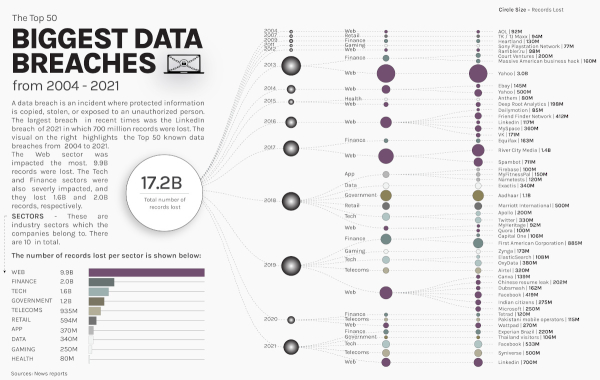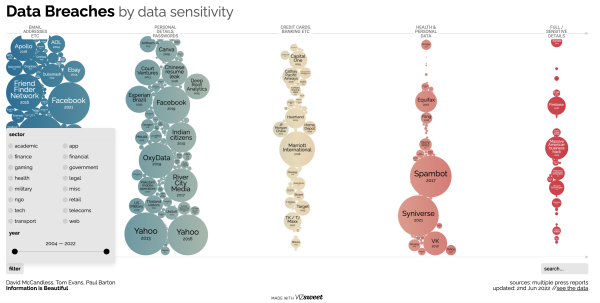In 2016, I received this e-mail from my oldest son, who used to be a cybersecurity professional.
Date: Saturday, October 22, 2016 at 7:09 PM
To: Howard Getson
Subject: FYI: Security Stuff
FYI - I just got an alert that my email address and my Gmail password were available to be purchased online.
I only use that password for my email, and I have 2-factor enabled, so I'm fine. Though this is further proof that just about everything is hacked and available online.
If you don't have two-factor enabled on your accounts, you really need to do it.
Since then, security has only become a more significant issue. I wrote about the Equifax event, but there are countless examples of similar events (and yes, I mean countless).
When people think of hacking, they often think of a Distributed Denial of Service (DDOS) attack or the media representation of people breaking into your system in a heist.
In reality, the most significant weakness is people; it's you ... the user. It's the user that turns off automatic patch updating. It's the user that uses thumb drives. It's the user that reuses the same passwords. But, even if you do everything right, you're not always safe.
Your data is likely stored in dozens of places online. You hope your information is encrypted, but even that isn't always enough. Over the last 17 years, 17.2B records have been "lost" by various companies. In 2021, a new record was set with 5.9 billion user records stolen.
VisualCapitalist put together a visualization of the 50 biggest breaches since 2004.
 Click To See Full Size via VisualCapitalist
Click To See Full Size via VisualCapitalist
InformationisBeautiful also put together a great interactive visualization with all of the breaches, if you want to do more research.

Click To See Interactive Version via InformationIsBeautiful
It's impossible to protect yourself completely, but there are many simple things you can likely do better.
- Use better passwords... Even better, don't even know them. You can't disclose what you don't know. Consequently, I recommend a password manager like LastPass or 1Password, which can also suggest complex passwords for you.
- Check if any of your information has been stolen via a website like HaveIBeenPwned or F-Secure
- Keep all of your software up to date (to avoid extra vulnerabilities)
- Don't use public Wi-Fi if you can help it (and use a VPN if you can't)
- Have a firewall on your computer and a backup of all your important data
- Never share your personal information on an e-mail or a call that you did not initiate - if they legitimately need your information, you can call them back
- Don't trust strangers on the internet (no, a Nigerian Prince does not want to send you money)
- Hire a third-party security company like eSentire or Pegasus Technology Solutions to help monitor and protect your corporate systems
How many cybersecurity measures you take comes down to two simple questions ... First, how much pain and hassle are you willing to deal with to protect your data? And second, how much pain is a hacker willing to go through to get to your data?
My son always says, "you've already been hacked ... but have you been targeted?" Something to think about!
The Social Media Universe
We recently dove into what's happening at Twitter. Since that article, Elon wrote an ultimatum e-mail to his employees saying that if they wanted to stay, they would have to work harder and longer than before ... and that they would get three months severance if they chose to leave. In a result that might have surprised Elon, thousands of Twitter employees quit. In response, Elon locked the doors, cut badge access, and attempted some damage control.
On top of that, you also have Meta having its own issues.
With that, it's probably a good time to take a look at the social media landscape. Here is an infographic that shows the relative popularity of various social media properties.
via visualcapitalist
If you rank the top 10 social media by monthly users, Twitter isn't even on the list. Nor is it on the list for driving clicks.
Meta and YouTube top the list - by a mile.
As well, there's a growing network of smaller social media vying for a spot in the global paradigm, like Parler, Mastodon, or even Onlyfans.
Meaning there's a lot more chaos in the system.
As always, chaos creates opportunity – in this case, both for new media and for brands to capitalize on the change in trends.
The question is, will Facebook and Twitter survive the storm, and if not, what will take their place?
Posted at 02:41 PM in Business, Current Affairs, Gadgets, Ideas, Just for Fun, Market Commentary, Trading, Web/Tech | Permalink | Comments (0)
Reblog (0)